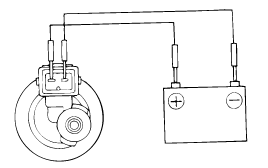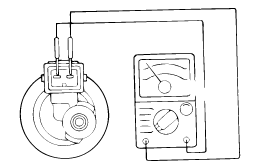Apply vacuum and check when voltage is applied to the evaporative emission canister purge solenoid valve and when the voltage is discontinued.
Battery voltage | Normal condition |
When applied | Vacuum is released |
When discontinued | Vacuum is maintained |

Disconnect the vacuum hose from the throttle body, and connect a vacuum pump to the vacuum hose.
Check the following points when the engine is cold [engine coolant temperature 60°C(140°F) or below] and when it is warm [engine coolant temperature 80°C(176°F) or higher].
Engine operation condition | Applied vacuum | Result |
Idling | 50 kPa (7.3 psi) | Vacuum is held |
3,000 rpm |
Engine operation condition | Applied vacuum | Result |
Idling | 50 kPa (7.3 psi) | Vacuum is held |
Within 3 minutes after enginestart at 3,000 rpm | Try to apply vacuum | Vacuum is held |
After 3 minutes have passed after engine start at 3,000 rpm | 50 kPa (7.3 psi) | Vacuum will be held momentarily. after which, it will be released. |
When disconnecting the vacuum hose, make an identification mark on it so that it can be reconnected to its original position.
Disconnect the vacuum hose from the solenoid valve.
Detach the harness connector.
Connect a vacuum pump to the nipple to which the red-striped vacuum hose was connected.
Apply vacuum and check when voltage is applied to the evaporative emission canister purge solenoid valve and when the voltage is discontinued.
Battery voltage | Normal condition |
When applied | Vacuum is released |
When discontinued | Vacuum is maintained |

Measure the resistance between the terminals of the solenoid valve.
Evaporative emission canister purge solenoid valve
Coil resistance :
26Ω [at 20°C (68°F)]
